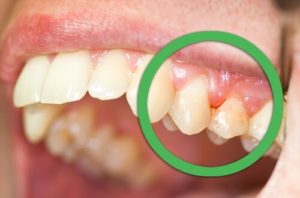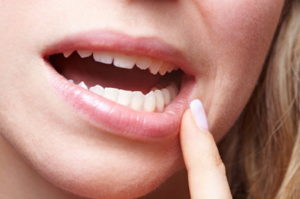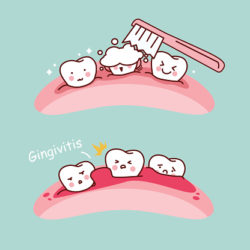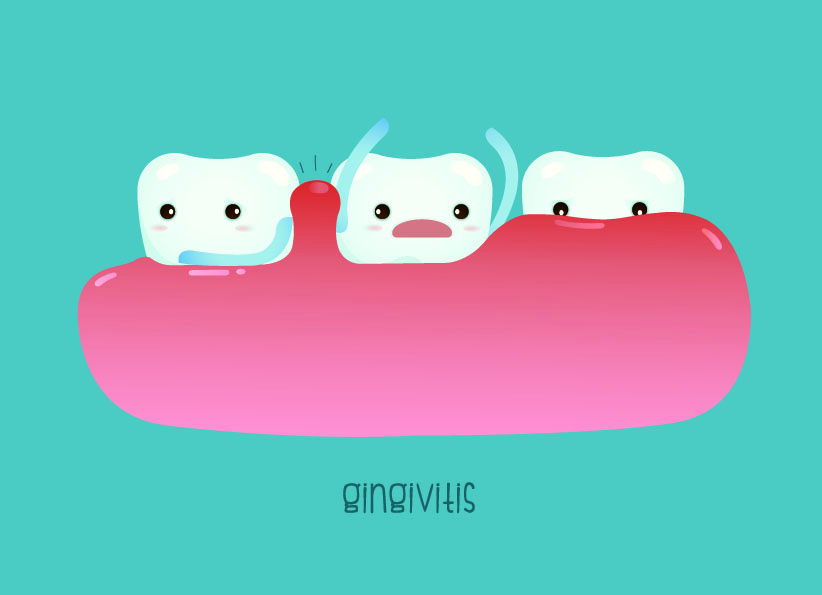We often dismiss our bleeding gums as the result of brushing too hard or blame our bad breath on that garlic dip we ate. But, bleeding gums and bad breath are also signs of gingivitis and must not be overlooked.
Gingivitis is a common gum disease that often goes undetected, so it is extremely important to know what to look for, how to prevent it and how also to treat it.
What is Gingivitis?
 No, gingivitis is not a healthy alternative to gingersnap cookies – although that would be a dream come true. Gingivitis is a mild form of gum disease most commonly caused by poor oral hygiene. But, don’t be fooled, by no means does mild equal minor.
No, gingivitis is not a healthy alternative to gingersnap cookies – although that would be a dream come true. Gingivitis is a mild form of gum disease most commonly caused by poor oral hygiene. But, don’t be fooled, by no means does mild equal minor.
Gingivitis is the initial stage of Periodontitis – an advanced gum disease – and could eventually lead to shrinking gums and falling teeth.
What causes Gingivitis?
The most common cause of gingivitis is the build-up of plaque, usually as a result of poor oral hygiene habits. You may be thinking how plaque build up on your teeth can lead to gum disease and that’s a fair point. But, plaque is crafty and has found a hiding spot in between the lower point of your gums and where your gums actually attach to your teeth. This hiding spot is called a sulcus and as plaque builds up, hardens and becomes tartar, gingivitis starts to form.
What are the risk factors?
 Unfortunately, gingivitis is a common condition and anyone can develop it. Even so, there are many factors that can increase your risk of developing gum disease.
Unfortunately, gingivitis is a common condition and anyone can develop it. Even so, there are many factors that can increase your risk of developing gum disease.
Of course your poor oral health habits will put you at the greatest risk of gingivitis. But there is a bright side, for taking care of your teeth is both quick and simple. For tips on the best way to brush and floss your teeth, see your dentist, and kill gingivitis before it even has the chance to say hello. Other major risk factors include smoking, diabetes, old age, poor nutrition and certain medications.
If you are worried about whether your medications could put you at risk, ask your dentist at your next appointment.
What are the symptoms of gingivitis?
 Much like a stealthy ninja, gingivitis can often go unnoticed, which is why you should always play close attention to what’s going on in your mouth. Make sure you are on the lookout for swollen or receding gums, gums that bleed easily when you brush or floss and bad breath.
Much like a stealthy ninja, gingivitis can often go unnoticed, which is why you should always play close attention to what’s going on in your mouth. Make sure you are on the lookout for swollen or receding gums, gums that bleed easily when you brush or floss and bad breath.
Pain when chewing and sensitive teeth are also prominent symptoms and shouldn’t be dismissed as simply a toothache. Another thing to keep an eye on is the colour of your gums – you want your gums to be a pale pink rather than a darkish red. If you notice any of these symptoms, see your dentist straight away and you can prevent the development of periodontitis and keep your pearly whites in your mouth, not just in a jar.
How is gingivitis diagnosed?
When seeing your dentist for a general checkup, they not only look out for cavities and plaque build-up but also for signs of gingivitis. This is why it is extremely important to make visiting your dentist a regular occurrence – and by visiting your dentist I don’t just mean for a coffee and a chat. But, if you are starting to notice any symptoms of gingivitis, schedule an appointment with your dentist.
The sooner you seek treatment, the better your chances are of eliminating your gingivitis and preventing further decay.
How is gingivitis treated?

cartoon tooth brush and gingivitis
The treatment of gingivitis is surprisingly simple. The first step is to relax and recline in your dentist’s chair as you receive a professional clean. A process known as scaling is used in order to effectively remove all signs of plaque and tartar. Once your mouth is plaque-free, it’s then your job to keep it that way with good oral hygiene. With proper brushing and daily flossing, you can keep away unwanted build up and reverse your gingivitis.
How can gingivitis be prevented?
Preventing gingivitis is much like treating gingivitis – brush and floss everyday to keep the plaque away. Eating the right foods is another preventive measure you can take.
Eating nutritious foods and cutting down on sugars will help ensure your teeth are healthy and strong in order to help combat the development of gum disease. But, to see if you are on the right track, schedule regular check-ups with your dentist and get their advice. After all, working to prevent gingivitis is the best way to make sure you always have healthy gums and a full set of teeth.
Call Proactive Dental today on 0754 331 569 with any further questions.

